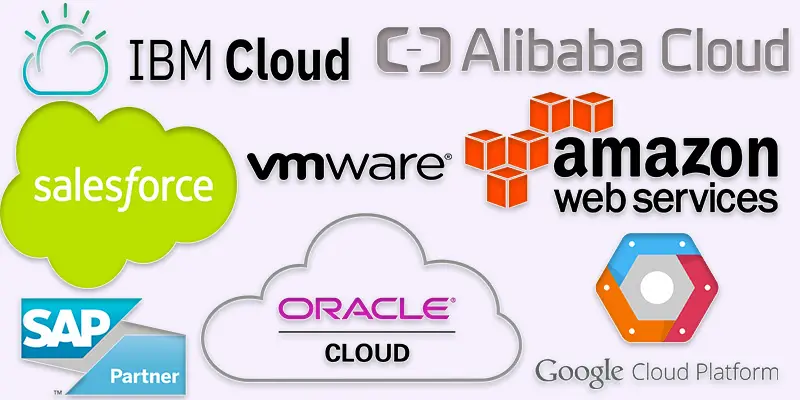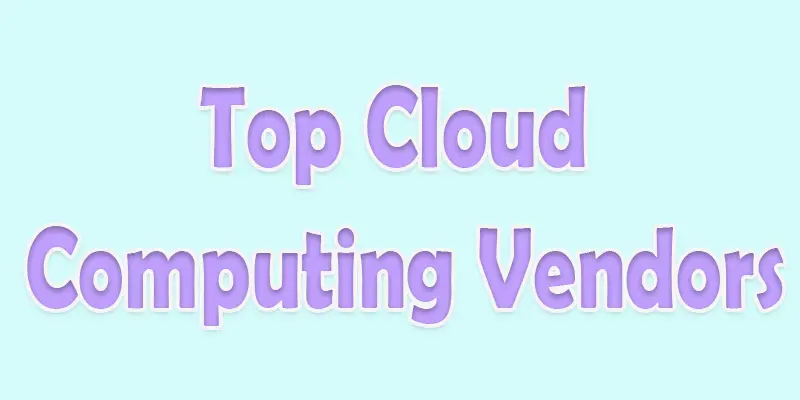Cloud Computing Vendors | Key Factors to Consider When Choosing
Published: 27 May 2025
Top Cloud Computing Vendor for Small Businesses
Did you know over 90% of businesses now use cloud services daily? But with so many options, choosing the right cloud computing vendor can feel confusing. You may wonder which one is secure, affordable, and easy to use. Whether you’re a small shop or a growing team, picking the wrong vendor can slow you down so let’s make it simple.
Top 10 Cloud Computing Vendors
Let’s look at the top cloud service providers that help you store data, run apps, and keep things working smoothly online.

- Amazon Web Services (AWS)
- Dell Technologies Cloud
- Google Cloud Platform (GCP)
- Oracle Cloud
- Alibaba Cloud
- IBM Cloud
- Salesforce
- SAP Cloud
- Microsoft Azure
- VMware Cloud
Amazon Web Services (AWS)
One of the largest Cloud technology providers worldwide is Amazon Web Services. It offers services like storage, servers, and databases that run online.
Example: Many websites use AWS to host their data and keep their sites running smoothly, like Netflix.
Microsoft Azure
Microsoft Azure is a cloud computing provider that assists companies with online data storage, app development, and service delivery. It works well with Windows and other Microsoft tools.
Example: Companies use Azure to back up files and run business apps like Microsoft 365.
Google Cloud Platform (GCP)
Cloud services like computation, storage, and machine learning are offered by Google Cloud Platform. It is renowned for its scalability and strong data tools.
Example: Google Photos uses GCP to store and manage billions of images from users worldwide.
IBM Cloud
Blockchain solutions, AI tools, and infrastructure are just a few of the cloud services that IBM Cloud provides. It is intended to support companies’ rapid growth and innovation.
Example: Companies like Red Hat use IBM Cloud for hybrid cloud solutions to manage both on-premises and cloud-based resources.
Oracle Cloud
Oracle Cloud provides cloud computing services focused on databases, applications, and enterprise solutions. It’s known for its strong security and support for large-scale businesses.
Example: Companies like Zoom use Oracle Cloud to handle their large amounts of data and ensure secure video communications.
Alibaba Cloud
One of Asia’s top cloud service providers, Alibaba Cloud provides computing, storage, and data management solutions to customers. It’s known for its scalability and strong presence in the e-commerce industry.
Example: Alibaba Group uses Alibaba Cloud to power its massive e-commerce platforms like Taobao and Tmall, handling millions of transactions daily.
Salesforce
Salesforce is a cloud-based platform that focuses on customer relationship management (CRM). It helps businesses track customer interactions, sales, and marketing efforts in one place.
Example: Companies like Adidas use Salesforce to manage customer data and improve their sales and marketing strategies.
SAP Cloud
SAP Cloud provides enterprise solutions for managing business operations, including finance, HR, and supply chain. It’s designed to help large organizations run smoothly and efficiently.
Example: Companies like Siemens use SAP Cloud to streamline their business processes and improve data analytics across different departments.
Dell Technologies Cloud
Dell Technologies Cloud offers a flexible cloud platform that combines public and private cloud services. It helps businesses manage workloads across different cloud environments.
Example: Companies like Lenovo use Dell Technologies Cloud to run their IT infrastructure and enhance collaboration across global teams.
VMware Cloud
VMware Cloud provides cloud services that help businesses run their virtual machines and applications seamlessly across private and public clouds. It focuses on virtualization and hybrid cloud solutions.
Example: Companies like GE use VMware Cloud to manage their workloads and IT infrastructure across multiple cloud environments.
Essential features of a trusted cloud computing vendor
Here are the key features to look for when choosing a cloud computing vendor:
- Security and Privacy: Strong encryption and data protection measures.
- User-Friendly Interface: Easy-to-navigate dashboards and tools.
- Customer Support: Access to 24/7 support and resources.
- Pricing Plans: Clear and flexible pricing based on your needs.
- Scalability: Ability to grow with your business.
- Reliability: High uptime and fast performance.
- Backup and Disaster Recovery: Ensure data can be restored quickly.
- Compliance: Adherence to industry standards and regulations.
Common Mistakes to Avoid in Cloud Computing
One mistake is choosing a cloud vendor based on price alone. While it might seem like the cheaper option, it could lack essential features or security, costing more in the long run.
Another mistake is ignoring data backup and disaster recovery plans. Without proper backup systems in place, you risk losing critical information during technical failures or outages.

How to Choose the Right Vendor (Step By Step)
- Define Your Needs: Determine what services you need (storage, software, computing power).
- Compare Pricing Plans: Look at costs and ensure they fit your budget.
- Evaluate Security Features: Check encryption, backup, and data protection options.
- Read Reviews and Ask for Recommendations: Get feedback from other users or businesses.
- Test with a Free Trial: Try before you buy to see if the platform meets your expectations.
- Consider Customer Support: Make sure there’s reliable support available when you need help.
Conclusion About Leading Cloud Computing Vendors and Their Services
The cloud infrastructure vendors you choose will significantly impact your business operations. After weighing your alternatives, I advise choosing a vendor who offers both strong security features and first-rate customer service. This will guarantee that you remain ahead of the curve in the rapidly evolving digital world of today. Make sure to do your research and take the next step in upgrading your infrastructure by choosing the right vendor for your needs.
FAQS
A cloud vendor is a company that provides cloud services like storage, computing power, and software over the internet for businesses and individuals to use.
The most well-known cloud provider is Amazon Web Services, which is renowned for its extensive service offering and global reach.
Microsoft Azure is the fastest-growing cloud vendor, gaining significant market share in recent years.
Amazon Web Services and Microsoft Azure are in high demand, as they offer reliable and scalable cloud solutions.
Yes, AWS (Amazon Web Services) is a leading cloud vendor providing a variety of cloud computing services.

- Be Respectful
- Stay Relevant
- Stay Positive
- True Feedback
- Encourage Discussion
- Avoid Spamming
- No Fake News
- Don't Copy-Paste
- No Personal Attacks

- Be Respectful
- Stay Relevant
- Stay Positive
- True Feedback
- Encourage Discussion
- Avoid Spamming
- No Fake News
- Don't Copy-Paste
- No Personal Attacks





